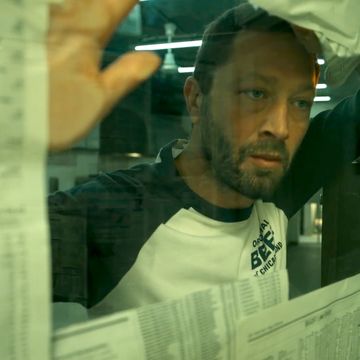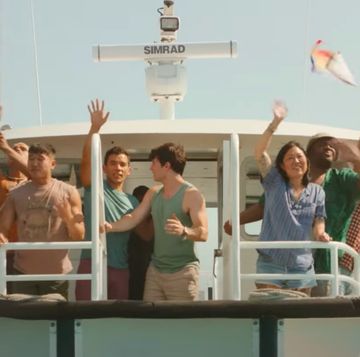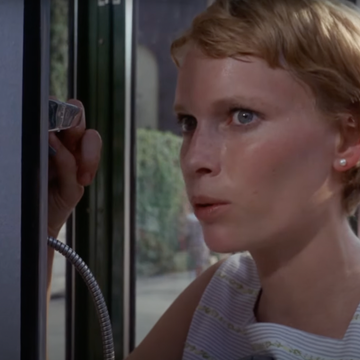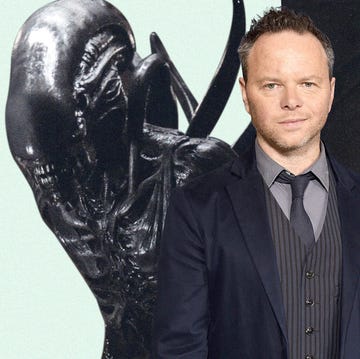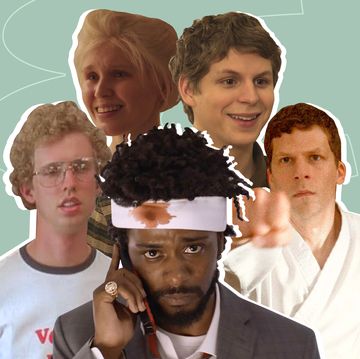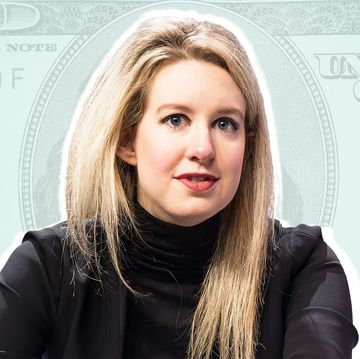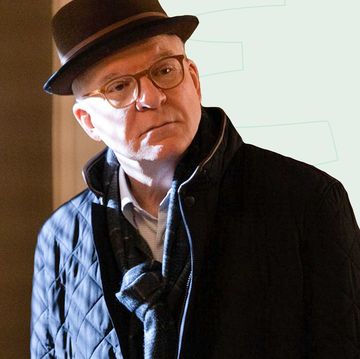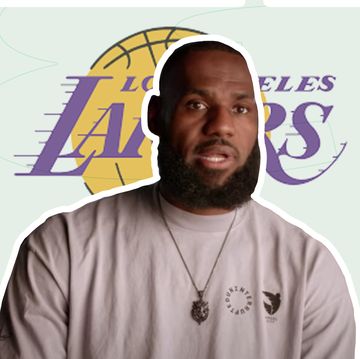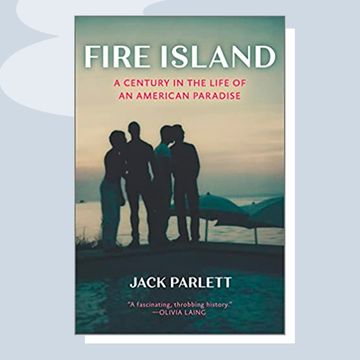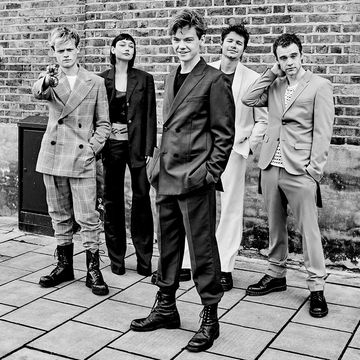In the fall of 1993, then-23-year-old David Holthouse went up to the Emerald Triangle in Northern California—the largest cannabis-producing region in the United States—to work on a weed farm. He had a friend up there and wanted to get away for a while. But his experience wasn’t anything like the escape he was hoping for. Instead, the densely wooded area was rife with paranoia. Weed farms sat behind giant locks, traps surrounded the plants, and workers in the region whispered about Sasquatch attacks at night.
One night while he was hanging out in front of the TV after a long day, two hysterical men arrived at the farm he was at, panicking about a Bigfoot attack at a neighboring farm. They said they had stumbled upon three men torn apart in the woods, with Bigfoot tracks surrounding them and weed plants scattered everywhere. Their fear was visceral. The farmer eventually calmed them down, and after they left, the workers who had witnessed the scene laughed it off uncomfortably. But David never forgot the frightening, bizarre encounter.
More than 20 years later, Holthouse's friend, director Joshua Rofé, texted him out of the blue with a strange question: Did he know any Sasquatch-related murder mysteries that could be the subject of a documentary?
David immediately texted back: "I got one. I'll call you in five." That story serves as the basis for Hulu's new three-part documentary Sasquatch, which premieres April 20. It's directed by Rofé and produced by Rofé, Holthouse, and the Duplass brothers.
Sasquatch is not a true crime documentary, really. It’s a journey back to the dark, unruly woods of the Emerald Triangle for investigative journalist David Holthouse, where he attempts to piece together the truth about his strange memory from 1993. But it turns out there’s nothing mythological about the woods where Sasquatches are legend to roam—the remote area is a very real, drug-fueled, sinister place where a journalist poking around about a twenty-year-old triple homicide is not particularly welcome. And as David delves further into the history of the Emerald Triangle, cannabis culture, and the people who live there, it slowly seems less insane to believe in monsters. Esquire talked to director Josh Rofé about the chilling documentary before its Hulu premiere—how it came to be, his experience filming in the woods of Northern California, and the many times in the process that he genuinely feared for his friend David’s life.
The doc is fascinating and so surprising. I would love to hear about how it came to be.
Josh Rofé: So February 2018, I was making my previous series Lorena. And I had sort of had this thought as we were getting in all of this amazing archival footage, and there was so much available to us because it was such a widely covered story. I started to wonder, well, what would it be like for my next thing? What if I made a story that you couldn't even Google? And that was sort of in my head for about a month. And then I had dinner with a good friend of mine named Zach Cregger, he's one of the exec producers on this show actually. And his parting words to me were, "Hey, you should check out this podcast called Sasquatch Chronicles. It's about people calling up with their encounter stories." And at face value, I was not interested, but he just stayed on me and said, "Just listen to one episode, and then if you don't like it, you never have to listen to another one again." And so the next day I listened to my first episode.
And cut to four days later, I'd listened to 11 episodes. And what I was so taken by was what I considered to be visceral fear. And I thought it was authentic, that visceral fear that I was sensing from the people who were calling up with their Sasquatch encounter stories. And so for about a week, I was just going back and forth in my head about, well, I'm going to make a Sasquatch something. I just don't know what that would be. And then what I arrived at was, well, what if I found a murder mystery that was somehow wrapped up in a Sasquatch story? That could really be something special. And I mentioned the fact that I was making Lorena particularly because David Holthouse was working with me on that at the time. And we were a few years into a working relationship and a friendship. And if you were me and you came up with that idea, the first person that you would reach out to, to see if they could dig and find, would be David Holthouse. I knew about his history of gonzo journalism, he's seen and done a lot of wild things. And so I sent him a text that very literally said, "Hey, this is the craziest text I'm going to send you for the next five years. I would love to find a murder mystery that is somehow wrapped up in a Sasquatch story, and if it exists, pursue it as the next project." And he wrote me right back and he said, "I love it. I got one. I'll call you in five." And he proceeded to tell me the story from that night in the cabin in 1993, when he was 23 years old. And as soon as he told me that, that's it. I knew that was what we would pursue.
How much time did you guys spend up in the Emerald Triangle?
I was on and off over the course of a little over a year. And usually, trips would be anywhere from probably four to seven days. And we just kept going up. Sometimes David would go up alone, once things really started to narrow in on certain leads and he couldn't have a whole crew with him. And he would just have whatever little camera could be in his pocket. But yeah, just a bunch of trips over the course of a little over a year.
Did your perspective on Sasquatches or weed culture change at all after you spent time there yourself? Did you go on in with any preconceived ideas that were challenged during the process?
I wouldn't even say that I had these preconceived ideas, so much as I didn't know much about any of it. When I make a doc, I'm usually just really excited to just see what we discover, and this was that but on steroids. There was no... I didn't go in with a social issue that I knew I had a strong feeling about, right? That wasn't this one, at face value at least, initially. It was just Sasquatch, a weed farm, a weed culture murder mystery. What the hell is any of this? I can't wait to find out. And so I really just went as a person who was just eagerly curious.
What was the most challenging part of making the doc?
The most challenging part was trying to find people in that sort of cannabis underworld who would be willing to speak to us. That took months. In fact, that was so difficult that there were times where I wondered if we were even going to be able to make the show. And so, I always say that I give the credit for the breakthroughs in that area to David. In many ways, while we're all making this together, we are documenting his journey with this investigation. And it was David's tenacity and really his skillset that he'd developed over the last 25-plus years as an investigative journalist that really allowed for and led to those eventual breakthroughs. And then it's like dominoes with these things, where things start to break open for you in bunches. And then all of a sudden, you're cold again and you got nothing. And then you just don't give up. You just keep pounding the pavement, and now there's another breakthrough. And oh, that one breakthrough just led to five different pathways. None of them seem connected, but we're going to go down all of them and see what happens. And then you find out, oh wow, there's an overlap with a couple of these things. So it was a lot of that. I mean, it was hard. This was definitely a hard one to make.
I watch a lot of true crime, and I find usually that they're either a recounting of a solved crime or an investigation of a mystery that's long gone cold. But what I found so fascinating about Sasquatch is that it's really neither of those. It's an active, real time investigation, and it’s so powerful because it uncovers a systemic issue that just hasn't been dealt with for a variety of reasons. So that real danger comes through, that so many docs in the genre just don't have.
That's amazing to hear. We knew that initially we were investigating what was essentially a ghost story. And there are no bodies, no crime, right? That's the saying, and it certainly was up there. And there was something about that, that at times you wonder, is this a fool's errand to start investigating a ghost story? And then one of those dominoes I mentioned earlier, all of a sudden just one thing falls, and now you're out of ghost story territory, at least a little bit. And then eventually, you arrive at these very real issues. Racism and trauma and all of these things that we, of course, we're never thinking about when initially embarking on looking into the Sasquatch murder mystery. But once those things started to show themselves as sort of overwhelmingly strong throughlines, in a lot of what we were looking into, it just... Things that didn't make sense earlier, suddenly made perfect sense. And you sort of realize, of course this is where we're ending up. It's always something that is truly evil and very real that you arrive at, if you dig deep enough.
In that sense, how did it differ from other projects for you, in terms of real danger?
Yeah. I mean, I'd never pursued something that was an active investigation before. And so that right away, set it apart. And I'd never been to a place that was so potentially dangerous. I mean, I'd shot in my first doc, it was called Lost for Life. It's about juveniles who are serving life in prison for first-degree murders. They were all convicted. And so I've been to a bunch of pretty hardcore prisons, probably a dozen or so. And there's a feeling that you have that sort of washes over you when you walk into one, when you pass through the metal detector and you are now there. If you were just a regular person like me, that could be a pretty loaded experience, where you do feel a bit of fear and your senses are heightened. But there was nothing like this. There was nothing like being in the woods and going to somebody's house and not knowing if you were going to be set up or not. And then even a step further and a step removed from even my experience, there were times when David... I mean, I was never alone out there. There were times when David, the only way he was going to be able to go somewhere, was completely alone and without us. And he did that a lot. And so a lot of times, my fear was really surrounding, is David going to be okay? And he would tell you himself that there were times where he didn't know what the answer to that question was going to be. And that question wasn't answered until he was out of those situations. Our guard was up the whole time. We always felt like we were overstaying our welcome, even though we intended not to. Yeah, it was a spooky experience for sure.
Did anything that you found surprising or interesting for any reason not make it into the doc?
Yeah. There are things that are not in the doc due to concerns about other people's safety. There's a no-holds-barred version of this doc that could have been made, that let's just pretend lawyers and legal departments didn't exist, right? Whispers, rumors, things that could have gone in the doc that either, hey, they don't pass legal muster, or okay, they do, but there are people who are not even in this thing who are going to be in real trouble. And maybe someone's going to want to come and hurt them, if this piece of information winds up in here. And so there was just a certain amount of consideration to, what do we or don't we include? That had never been a part of my process before. And I think that is, in many ways, a symptom of the fact that this was an active investigation into something that maybe did or didn't happen deep in the woods. And either way, there's a number of people who live out there who don't want you coming anywhere near it, asking questions. Yeah. I mean, we really kicked the hornet's nest on this one.
Speaking of, how are you feeling about the potential reaction to the doc from the community in Mendocino County, if you anticipate anything?
Honestly, impossible to say. We've heard from a few people who are in it, they've seen the trailer and they've read some of the pieces that have come out and they're happy with what they're seeing and reading. But I think, anytime you're talking about an alleged triple homicide that allegedly is unsolved, people are going to be nervous.
I'd love to hear a little bit more about working with David, and times that you were ever truly fearful for him.
God, I can tell you this one story. So there was this one time that we were up there. We were filming throughout the day, and then David was going to go meet with a potential source for the first time at 3 p.m., in a very public place. By 11 p.m., the location for this meeting had been changed multiple times. I think twice. And now what that meant, was David was going to go meet this person in a place that was no longer public. And when David got there, oh, by the way, there's eight other people who you're going to meet also. And so he was completely outnumbered in this private location. And as that night wore on, people started to talk, and there were little breadcrumbs. And things that David was up there poking around about, seem to just be common knowledge amongst this stead. And one person said, oh, you should talk to so-and-so. Let's call him up. I think he might be an interesting person for you to talk to. And so David gets on the phone with this person and they tell him... They give him a particular piece of information. But nothing too juicy. Nothing super juicy is going to be given over the phone, right? They say, "Why don't you come out and see me? And we can talk more." And David says, "Great. What's your day like tomorrow?" And they said, "No, why don't you come see me now?" And David said, "Now? It's midnight." And the guy says, "Yeah. I'm only about three hours away."
Oh my god.
David tries to brush it off with, "Oh, man. It's been a long day. We were filming. I'm pretty exhausted." But then another person standing right next to David says, "I'll drive you." And so now they're all pressuring him to get in somebody else's car to be driven three hours away. I mean, in the middle of the night to somewhere deep in the woods in Northern California to go get a potentially crucial piece of information about this alleged triple homicide. And all the while, I'm back at the hotel, I'm getting text message updates from David anytime he could sneak away to go to the bathroom, and just praying that he's going to make it out alive. And then finally, sometime close to 3 a.m. He just texted me, "I'm out. I'm in the car. I'm safe." It was nuts. It was so much like that. There was another time where he was going to go up to Spy Rock alone. And there was real concern for that because to go up to Spy Rock, your cell phone doesn't work, there are no roads. There are no actual roads once you get to a certain point, it's just turn left at that tree stump, kind of thing. And so if you go missing, nobody has any clue. They don't know where you are. Even if they knew where you were, they wouldn't know how to get to you. And so there was this one day where I was like, "David, do me a favor. Promise me you're not going to go up to Spy Rock today. We don't need to get you killed. Not good for our friendship. It's not good for your existence. It's not good for the show. Nothing to gain here, buddy. Just please, let this be a day where I'm not going to have a heart attack.” And he says, "Yeah, yeah. No problem."
Six hours later, I get a piece of footage texted to me. And it's footage that he shot on his phone, up on Spy Rock. And some of it is footage that ended up in the show. And it was a moment that he was really terrified actually, and wondered if he was going to make it out alive. And you have these sort of dueling reactions, which is one, you said you weren't going to go. Why did you go? And two, oh my God, I cannot believe what I just watched. I cannot believe you got that. But you made it out of there, now you don't ever need to do that again. Then the next day. Boom. All of a sudden, got a text message. He's back up there. More footage. And so this was really... This was dangerous in a very real way, and in very unexpected ways, constantly. I couldn't wait for us to be done filming. It always felt like we were just a hair away from something going horribly wrong.
He was definitely the right guy for the job, but I can’t imagine how scary that was. I’d also love to hear about the illustrations that you used to recreate his 1993 experience.
Oh, for sure. The artist is Drew Christie, and he is brilliant. So early conversations, we were wondering, okay, there are large chunks of this story that no archival materials exist for. How are we going to represent them on the screen? And Mark Duplass said, "Hey, what about animation?" And I didn't love that idea initially, because animation and docs was just, at that point, not something that had really spoken to me. And I know Mark felt the same way. He told me later, when he threw out the idea, it wasn't one that he was totally sold on by any stretch. But he said "Why don't you talk to this animator who we've worked with? His name's Drew Christie. He lives in the Pacific Northwest. Just have a conversation with him." And so I got on the phone with Drew, and what I essentially told him, was the story that David tells that occurred in the cabin that night in the fall of '93. It was really a test. I said, "I don't think of this as a documentary. It is, but I think of this as a graphic novel because so much of this is just larger than life. It is a story full of so many things that you just can't grasp." And I said, "So that's what I'm thinking. That's what my approach is, visually and tonally. Graphic novel come to life. That's what I'm after here." And I sent him a two minute clip of David telling that story from the cabin that night in '93. About two weeks later, I got back 90 seconds of animation set to David telling that story. And if you cut forward to the finished version of the series, I'm not sure if even a frame changed from what Drew originally did in that test. It was as though it came out of him fully formed. He created that world. He connected with that in such an organic and, I think amazing way, right off the bat. You could give Drew a concept and then he would come back with something that was just so visceral and alive. And there were times where you didn't need to give him anything. You'd send him a seven minute sequence and there's black holes in it, and you're hearing David tell certain stories from back in '93 and then Drew just comes back with... He's filled in the world. He's just so talented. He's really incredible.
What was your biggest takeaway from creating the series?
Going into making the series I had no idea how much trauma was in those woods. Both historical and ongoing. What goes on out there is truly sinister. We were lucky to make it out alive.






